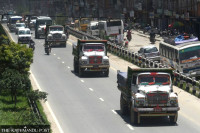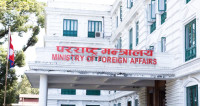National
Cyber crimes of harassing women on rise
On an evening in 2012, Uma Khadka (name changed) was out with her friends at a restaurant. She got a frantic call from her sister, who alerted her about the nude photos of women leaked from her Facebook page. Bewildered, Khadka checked her profile immediately and removed the posts.
Samipa Khanal
On an evening in 2012, Uma Khadka (name changed) was out with her friends at a restaurant. She got a frantic call from her sister, who alerted her about the nude photos of women leaked from her Facebook page. Bewildered, Khadka checked her profile immediately and removed the posts.
After the incident, she registered a case with the police and filed one later in the Kathmandu District Court, seeking action against those who breached her account to post the materials. The case was solved after one year following a lengthy court procedure.

Khadka’s case is one of the 82 related to harassment of women on social networking sites since fiscal year 2011-12. The data of the Kathmandu District Court show there has been a steady rise in complaints by women that they have been harassed or victimised on Facebook, Instagram and Twitter, among other networks.
According to the court statistics, almost 50 percent of cyber crime cases are related to harassment of women. Of the total 11 cyber crime cases filed in the Kathmandu District Court in FY 2012-13, six were related to women’s harassment. The number was 27 in FY 2013-14, 13 in FY2014-15, 19 in FY2015-16 and 14 in the first nine months of the current fiscal.
Statistics from the Metropolitan Police Crime Division, Kathmandu also paint a similar picture. According to the MPCD, there has been an escalation in the cases registered at the division of women troubled through social media. There were 91 cases filed in FY 2013-14, 221 in 2014-15 and a whopping 769 in the fiscal year 2015-16.
“Of late, there has been a spike in such incidents. At times, our cyber crime cell receives around 20 cases of sexual harassment through social networking sites in a single day,” said Deputy Superintendent of Police Pashupati Ray. “Almost all the cases of cyber crime registered in the MPCD are related to social networking sites with more than 80 percent women victims.”

Police said women were often found to be blackmailed by their former boyfriends after they part ways especially when the couples in relationship shared their passwords. Criminals post obscene photoshopped pictures on others’ pages, send spam on Messenger while some use photos of women to open new accounts and trick men.
The MPCD said the longing of Nepali women to go abroad or marry a foreigner has led men to open fake accounts with photos of foreigners to attract such women and trick them.
DSP Ray suggests that women should be extra careful about their privacy settings on internet platforms.
Nepal Police defines cyber crime as harassment through social networking sites, email threats, illegal data access, ATM breaches, server hacks, obscene websites, copyright and phishing (an attempt to obtain sensitive information such as user names, passwords, money by disguising as a trustworthy entity in an electronic communication).
Legal experts find it worrisome that not all women who have been victimised seek legal remedy. “At times we have to deal with critical cases which cannot be disclosed. Cyber crimes, especially the cases of harassment against women, are the most sensitive cases where the victim does not want to disclose identity even to the lawyers and keep away from the court procedures,” said Dhurba Kumar Upreti, under-secretary at the Nepal Judicial Service.




 20.06°C Kathmandu
20.06°C Kathmandu















